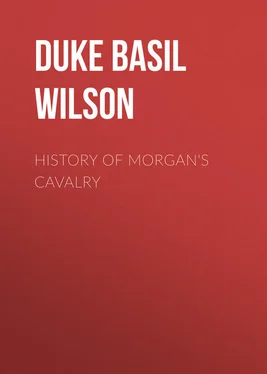Basil Duke - History of Morgan's Cavalry
Здесь есть возможность читать онлайн «Basil Duke - History of Morgan's Cavalry» — ознакомительный отрывок электронной книги совершенно бесплатно, а после прочтения отрывка купить полную версию. В некоторых случаях можно слушать аудио, скачать через торрент в формате fb2 и присутствует краткое содержание. Издательство: Иностранный паблик, Жанр: foreign_antique, foreign_prose, на английском языке. Описание произведения, (предисловие) а так же отзывы посетителей доступны на портале библиотеки ЛибКат.
- Название:History of Morgan's Cavalry
- Автор:
- Издательство:Иностранный паблик
- Жанр:
- Год:неизвестен
- ISBN:нет данных
- Рейтинг книги:3 / 5. Голосов: 1
-
Избранное:Добавить в избранное
- Отзывы:
-
Ваша оценка:
- 60
- 1
- 2
- 3
- 4
- 5
History of Morgan's Cavalry: краткое содержание, описание и аннотация
Предлагаем к чтению аннотацию, описание, краткое содержание или предисловие (зависит от того, что написал сам автор книги «History of Morgan's Cavalry»). Если вы не нашли необходимую информацию о книге — напишите в комментариях, мы постараемся отыскать её.
History of Morgan's Cavalry — читать онлайн ознакомительный отрывок
Ниже представлен текст книги, разбитый по страницам. Система сохранения места последней прочитанной страницы, позволяет с удобством читать онлайн бесплатно книгу «History of Morgan's Cavalry», без необходимости каждый раз заново искать на чём Вы остановились. Поставьте закладку, и сможете в любой момент перейти на страницу, на которой закончили чтение.
Интервал:
Закладка:
His benevolence was so well known in Lexington, that to "go to Captain Morgan" was the first thought of every one who wished to inaugurate a charitable enterprise, and his business house was a rendezvous for all the distressed, and a sort of "intelligence office" for the poor seeking employment. His temper was cheerful and frequently gay; no man more relished pleasantry and mirth in the society of his friends, with whom his manner was free and even at times jovial; but he never himself indulged in personal jests nor familiarities, nor did he permit them from his most intimate associates; to attempt them with him gave him certain and lasting offense. There was never a more sanguine man; with him to live was to hope and to dare. Yet while rarely feeling despondency and never despair, he did not deceive himself with false or impossible expectations. He was quick to perceive the real and the practical, and while enterprising in the extreme he was not in the least visionary. His nerve, his powers of discrimination, the readiness with which he could surrender schemes found to be impracticable, if by chance he became involved in them, and his energy and close attention to his affairs, made him very successful in business, and undoubtedly the same qualities, intensified by the demand that war made upon them, contributed greatly to his military success.
But it can not be denied that not only the reputation which he won, but the talent which he displayed, astonished none more than his old friends. He would, I think, have been regarded as a remarkable man under any circumstances, by all who would have intimately known him, but he was born to be great in the career in which he was so successful. It is true that war fully developed many qualities which had been observed in him previously, and (surest sign of real capacity) he to the last continued to grow with every call that was made upon him. But he manifested an aptitude for the peculiar service in which he acquired so much distinction, an instinctive appreciation of the requisites for success, and a genius for command, which made themselves immediately recognized, but which no one had expected. Nature had certainly endowed him with some gifts which she very rarely bestows, and which give the soldier who has them vast advantages; a quickness of perception and of thought, amounting almost to intuition, an almost unerring sagacity in foreseeing the operations of an adversary and in calculating the effect of his own movements upon him, wonderful control over men, as individuals and in masses, and moral courage and energy almost preternatural.
He did not seem to reason like other men, at least no one could discover the logical process, if there was one, by which his conclusions were reached. His mind worked most accurately when it worked most rapidly, and sight or sound were scarcely so swift as were its operations in an emergency.
This peculiar faculty and habit of thought enabled him to plan with a rapidity almost inconceivable. Apparently his combinations were instantaneously commenced and perfected, and, if provided with the necessary information, he matured on enterprise almost as soon as he conceived it. His language and manner were often very expressive of this peculiar constitution of mind. In consultation with those whom he admitted to his confidence, he never cared to hear arguments, he would listen only to opinions. In stating his plans, he entered into no explanations, and his expressions of his views and declaration of his purposes sounded like predictions. At such times his speech would become hurried and vehement, and his manner excited but remarkably impressive.
He evidently felt the most thorough and intense conviction himself, and he seldom failed to convince his hearers. Advice volunteered, even by those he most liked and relied on, was never well received, and when he asked counsel of them he required that it should be concise and definite, and resented hesitation or evasion. Without being in the ordinary sense of the term an excellent judge of character, he possessed, in a greater degree than any of his military associates, the faculty of judging how various circumstances (especially the events and vicissitudes of war) would affect other men, and of anticipating in all contingencies their thoughts and action. He seemed, if I may use such expressions, capable of imagining himself exactly in the situations of other men, of identifying his own mind with theirs, and thinking what they thought. He could certainly, with more accuracy than any one, divine the plans and wishes of an enemy. This was universally remarked, and he exhibited it, not only in correctly surmising the intentions of his own immediate opponents, but also in the opinions which he gave regarding the movements of the grand armies. He sought all the information which could however remotely affect his interests and designs with untiring avidity, and the novel and ingenious expedients he sometimes resorted to in order to obtain it, would perhaps furnish materials for the most interesting chapter of his history. It was a common saying among his men, that "no lawyer can cross-examine like General Morgan," and indeed the skill with which he could elicit intelligence from the evasive or treacherous answers of men unwilling to aid, or seeking to deceive him, was only less astonishing than the confidence with which he would act upon information so acquired. In army phrase, he was a capital "judge of information," that is, he could almost infallibly detect the true from the false, and determine the precise value of all that he heard. His quickness and accuracy, in this respect, amounted almost to another sense; reports, which to others appeared meager and unsatisfactory, and circumstances devoid of meaning to all but himself, frequently afforded him a significant and lively understanding of the matters which he wished to know.
He had another faculty which is very essential to military success, indispensably necessary, at any rate, to a cavalry commander who acts independently and at such distances from any base or support as he almost constantly did. I believe the English term it, having "a good eye for a country." It is the faculty of rapidly acquiring a correct idea of the nature and peculiar features of any country in which military operations are to be conducted. He neglected nothing that a close study of maps and careful inquiry could furnish of this sort of knowledge, but after a brief investigation or experience, he generally had a better understanding of the subject than either map-makers or natives could give him.
However imperfect might be his acquaintance with a country, it was nearly impossible for a guide to deceive him. What he had once learned in this respect he never forgot. A road once traveled was always afterward familiar to him, with distances, localities and the adjacent country. Thus, always having in his mind a perfect idea of the region where he principally operated, he could move with as much facility and confidence (when there) without maps and guides as with them. His favorite strategy, in his important expeditions or "raids," was to place himself by long and swift marches – moving sometimes for days and nights without a halt except to feed the horses – in the very heart of the territory where were the objects of his enterprise. He relied upon this method to confuse if not to surprise his enemy, and prevent a concentration of his forces. He would then strike right and left. He rarely declined upon such expeditions to fight when advancing, for it was his theory that then, a concentration of superior forces against him was more difficult, and that the vigor of his enemy was to a certain extent paralyzed by the celerity of his own movements and the mystery which involved them. But after commencing his retreat, he would use every effort and stratagem to avoid battle, fearing that while fighting one enemy others might also overtake him, and believing that at such times the morale of his own troops was somewhat impaired. No leader could make more skillful use of detachments. He would throw them out to great distances, even when surrounded by superior and active forces, and yet in no instance was one of them (commanded by a competent officer and who obeyed instructions) overwhelmed or cut off. It very rarely happened that they failed to accomplish the purposes for which they were dispatched, or to rejoin the main body in time to assist in decisive action. He could widely separate and apparently scatter his forces, and yet maintain such a disposition of them as to have all well in hand. When pushing into the enemy's lines he would send these detachments in every direction, until it was impossible to conjecture his real intentions – causing, generally, the shifting of troops from point to point as each was threatened; until the one he wished to attack was weakened, when he would strike at it like lightning.
Читать дальшеИнтервал:
Закладка:
Похожие книги на «History of Morgan's Cavalry»
Представляем Вашему вниманию похожие книги на «History of Morgan's Cavalry» списком для выбора. Мы отобрали схожую по названию и смыслу литературу в надежде предоставить читателям больше вариантов отыскать новые, интересные, ещё непрочитанные произведения.
Обсуждение, отзывы о книге «History of Morgan's Cavalry» и просто собственные мнения читателей. Оставьте ваши комментарии, напишите, что Вы думаете о произведении, его смысле или главных героях. Укажите что конкретно понравилось, а что нет, и почему Вы так считаете.












